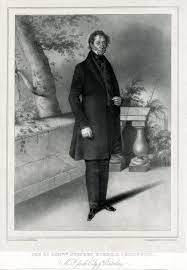Stephen Rumbold Lushington ( 1776-1868) was an officer of East India Company and served as Collector of Ramnad and Tinneveli before assuming power as Governor of Madras in 1828, on the death of Sir Thomas Munro. His reign was controversial, marked by a running feud with Sullivan, but he did make an effort to establish the Nilgiris as a British colony. He declared Ooty a Military Station and visited it more often than any other governor before or after him.
Lushington developed the old Coonoor ghat road (Nellithorai), and later, the Sispara ghat to connect the Nilgiris directly with Malabar. He arranged for the import of trees and seeds from England and set up an Experimental Farm in Keti, where the first successful tea plant was grown. Towards the end of his term he bought the bungalows, originally built at the time of Sullivan’s first camp at Dimbatty, and donated them for the free use of invalid soldiers.
Governor Lushington’s prime contribution to Ooty was the construction of the first Anglican Church, St. Stephen’s church, which was the first landmark of the budding town. The foundation for the church was laid in 1829 and it was completed in 1831 with some of the timbers removed from the Lal Bagh Palace of Tipu Sultan in Mysore.
Lushington also financed the first but short lived hotel by William Rumbold which later became the prestigious Ootacamund Club.
Nilgiri Documentation Centre

